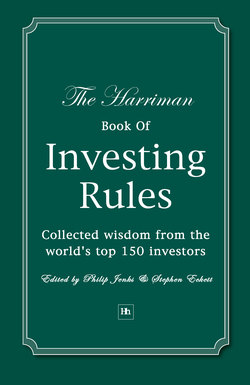Читать книгу The Harriman Book Of Investing Rules - Stephen Eckett - Страница 27
На сайте Литреса книга снята с продажи.
ОглавлениеLaurence Copeland
Laurence Copeland holds the Chair of Finance at Cardiff University. His papers in academic journals cover a range of subjects including: inflation and the Phillips Curve, exchange rates and currency markets, stock and bond markets, index futures, mutual funds, Asian markets and the impact of the 1997-8 crisis.
Books
Exchange Rates and International Finance (3rd ed.), Pearson Education, 2000
Exchange Rates and International Finance (4th ed.), FT Prentice Hall, 2004
Currencies
1. All things in moderation, especially greed.
Don’t try too hard to buy at the bottom and sell at the top. Either be a long term investor, holding through ups and downs, or be prepared to sell out when you have made a reasonable profit, even if you subsequently find you could have done better by holding on. A short term investor is a gambler, so he or she should be ready to leave something on the table when they leave.
2. Market gurus repeat themselves, but history never does.
The past often seems to provide hints about the future, but usually the hints are unreliable signposts. So exchange rates may always have risen when the central bank raised interest rates, but that doesn’t mean it’ll be the same this time around. Like the weather, there are always new records being set, and that means precedents are no help.
3. “Ripeness is all” (Shakespeare).
The fruit falls when it’s ripe. Any later and it goes rotten. Timing is everything, in the markets as elsewhere - something economists often forget. For example, it didn’t take a genius to figure out that tech stocks were overvalued long before the peak of the boom. But you could have lost a lot of money going short on the way up, and several fund managers lost their jobs because they kept out of the market bonanza. Another example is the overvaluation of the US dollar in the first half of the 1980’s. So figuring out which stocks or currencies are mispriced is no help. The key to making money is knowing when the mispricing is going to be corrected (or, as is usually the case, overcorrected).
4. The more extreme the conditions, the more efficient the market.
The higher the inflation rate, the more rationally the money and currency markets behave, perhaps because the cost of getting it wrong is simply too high. So, in the extreme cases of hyperinflation, every 1% rise in the inflation rate leads almost immediately to an increase in interest rates and fall in the value of the currency.
5. Fixed exchange rates: the triumph of hope over experience.
No fixed exchange rate ever stayed fixed forever. At some point, the system offers speculators a one-way bet. Why not take it?
6. The predictive power of forward rates is more or less nil.
Forward rates simply track spot rates. The forward premium or discount is no guide to whether a currency is going to appreciate or depreciate.
7. Long calm spells, punctuated by stormy periods.
Even with a floating exchange rate, a currency market will often seem to have gone to sleep, with nothing much happening for months or years. Invariably a storm will blow up sooner or later, with a sudden sequence of high volatility days, often with no obvious news to trigger the activity.
8. The Anglo-Saxon Block.
The English-speaking currencies (Pound, US and Canadian Dollars) move together most of the time, in the Northern hemisphere at least. In particular, the Pound and the Dollar are highly correlated, and membership of the EU and the single market (and the foundation of NAFTA) seems to have made little difference to this pattern.
9. Don’t bet against the dollar . . .
It’s not that it will never again fall from its pedestal. It’s simply that we don’t know when. So, as long as the US was booming, all the pundits said the strong economy was pushing up the dollar’s value. When the US economy took a dive in Winter 2000-1, what happened? You guessed right, the dollar was even stronger. A safe haven in a world threatened by an impending US recession, many pundits said. Hence, the final piece of advice . . .
10. . . . get a job as a currency guru.
The great thing about mission impossible is that nobody expects you to be successful. Failing to work miracles is not adequate ground for dismissal. The pay is good too.
